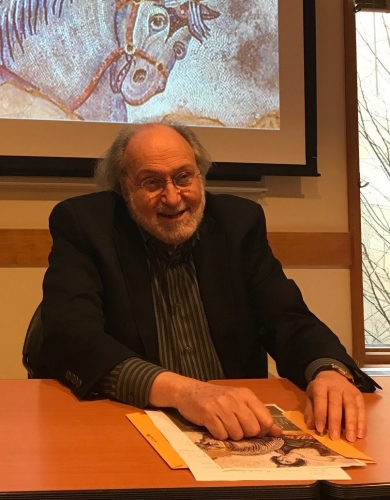
On Monday, February 26, the Hellenic Studies Program at the MacMillan Center hosted a presentation by Dimitri Gutas, Professor of Arabic and Graeco-Arabic, Yale University, on “Hellens, Romans, Christians, Arabs, Turks, Romioi: Greeks Studying Hellenism.” The talk is the first of a series called “Post-Antiquity Revisited” and is dedicated to Professor Gutas, who is retiring.
Professor Gutas states in his article, The Historical and Ideological Dimensions of Graeco-Arabic Studies: The Conquest of Knowledge from Alexander the Great to Meḥmed the Conqueror, “The Graeco-Arabic translation movement of the early ʿAbbāsid period (eighth to tenth centuries) is not an isolated cultural phenomenon, but is part—indeed, arguably the most important and central part—of a long historical process…” In his presentation, he notes that the scholarly discipline of historical linguistical transfer of one culture’s philosophical works, including medicine, mathematics into Arabic was critical in shaping of information and knowledge that spanned hundreds of years. The very expensive and time-consuming translation movement, in discussion, spanned from approximately ca. 850 with the beginnings of Syriac translations of Greek philosophical texts to ca.1330 with the Hermannus Alemannus in Latin and Todros Todrosi in Hebrew. While transfer movements are often known in linear forms, this was not the case according to Professor Gutas. The entire movement was complex and critical in helping to shape the dissemination of interdisciplinary subjects. These core subjects addressed various socio-political underpinnings of their time bringing together visionaries, thinkers, ideas from the far East and Europe into Baghdad—a city which became a hub of knowledge exchange. The movement furthermore, became a major social, political, system that propelled many types of ancient Greek knowledge forward. It is also established that Syriac became a strong intermediary or liaison system for the movement of Greek works into Syriac and into Arabic for codification and use by the caliphates. Professor Gutas credits the success of this dissemination to Aristotle’s innovation to organize and classify knowledge. Aristotle provides us with theoretical knowledge (metaphysics), the practical sciences (governance in regular city life and structure, ethics), productive sciences (creation of rhetoric in order to instill better political influence).
Professor Gutas outlined three key foundational elements in ancient Hellenic thought: First, that the science was consciously an “open-ended study into the reality of ‘how things work’ accomplished on the basis of experience and reasoning. Second, the establishment of casual relationships, and, finally, the ‘self-interrogation’ to see if the methodology was correct. It is also known that the translation movement came to be a highly political act.”
After the conquests of Alexander, the spread of Greek learning throughout the middle east and north Africa became ubiquitous. Many of the native cultures participated in the scientific inquiry and the area gave birth to many young philosophers of considerable note. Professor Gutas also noted that by the end of the 4th c. a number of other Greek institutions fell into disrepute or were completely abandoned (theater and ancient athletics, for example) but not the curriculum. Its core elements were adopted and translated into Syriac, Arabic, Latin, and Hebrew for posterity.
The 7th century, heralded translations of Aristotelian works into Arabic. Furthermore, it became important for the rulers in that region, to be seen as a protector and progenitors of culture. With the passage of time, this era came to be known as the Islamic Golden Age, the Abbasaid historical period where science, literature, philosophy, mathematics flourished. The entire area of interest developed an enduring curiosity to transmit Greek scientific and philosophical works to the Islamic world through the significant Graeco-Arabic translation movement, jump-started by the Caliphates during the 9th century. Importantly, the Muslim rulers saw contradiction between Greek writings and religious belief and therefore continued on the process of translations.
Professor Gutas stated that throughout the period between Alexander the Great to Meḥmed the Conqueror the prevalent translations were from Greek into Syriac, Hebrew, Arabic, and Latin. Quite often the translations into Latin were based on Arabic and on occasion on Hebrew translations. It was only toward the end of the Medieval period that the western Latin had access to Greek manuscripts. The transmitted scientific knowledge was of practical nature and benefitted its community and “knowledge codified and stored became a desired commodity to show how great rulers are. All rulers throughout history desire to see themselves legitimized in the eyes of the people and other rulers, by having access to, and being the protector of knowledge.”
The intellectual history of early Islamic civilization, transformed ancient Greek thought and facilitated its spread beyond the boundaries of Greek speaking areas. The movement’s incredible position in Islamic civilization of the early period of the Abbasaid Caliphate provides us with a unique and deep understanding of the major political, ideological, and social factors involved in the creative process of knowledge translation and dissemination.
The burning of the Great Library of Alexandria and the Baghdad Library—also known as the House of Wisdom—were a colossal loss for humanity. It is thought that only two percent of ancient manuscripts survived. However, of those that did survive through the ages, as Professor Dimitri Gutas continues to demonstrate in his ground-breaking work, the translations enable us to reconstruct the complex network of scientific inquiry through the ages.
Written by Shams-il Arefin Islam, a Yale School of Forestry and Environmental Science 2017 graduate. He researched for Ashoka Fellows on climate change, and worked for the U.S. Presidential Award Recipient and Nobel Peace Prize Laureate Professor Muhammad Yunus.
